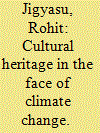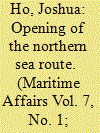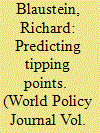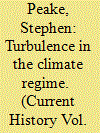| Srl | Item |
| 1 |
ID:
170839


|
|
|
|
|
| Summary/Abstract |
Climate change is defined by the Intergovernmental Panel on Climate Change (IPCC) as "a change in the state of the climate that can be identified (e.g., using statistical tests) by changes in the mean and/or the variability of its properties, and that persists for an extended period, typically decades or longer"1. Climate change encompasses more than a worldwide trend of rising temperatures or 'global warming,' to include changes in regional climate characteristics such as humidity, rainfall and wind, and an observed increase in the frequency of extreme weather events, which will have biophysical, social, and economic impacts.2 However, climate change is not a figment of imagination of a distant future. Today, we are faced with rising sea levels, extreme temperatures, and more frequent and intense hydro-meteorological hazards that are already taking their toll on cultural heritage. Unfortunately, the scenarios presented by climate scientists are rather gloomy and the extent of impact on cultural heritage is likely to further accelerate exponentially. Using various case examples, this paper will explain how climate change is creating environmental conditions that are increasing the vulnerability of cultural heritage to various hazards, thereby exposing it to various risks. While there is a definite need to continue undertaking further research through a collection of highly calibrated data and sophisticated modelling for developing probable climate change induced scenarios for the future, it is equally important to invest in translating our progressively enhanced understanding of climate change risks into simple, achievable practices for day-to-day management of cultural heritage. These would include various preventive conservation techniques, enhanced monitoring systems, and adaptation strategies. Equally important is to rediscover and adapt traditional knowledge that has evolved over time in response to changing constraints and opportunities. This paper will showcase various practices from around the world to learn from their success and failure in dealing with the challenges posed by climate change.
|
|
|
|
|
|
|
|
|
|
|
|
|
|
|
|
| 2 |
ID:
093332


|
|
|
| 3 |
ID:
106764


|
|
|
| 4 |
ID:
138552


|
|
|
|
|
| Summary/Abstract |
At the time he attended the 2004 European Open Science Forum in Stockholm, German physicist Hans Joachim Schellnhuber had been speaking out publicly since the late 1990s about climate change impacting what he termed “the Achilles heels of the Earth system.” Using science-speak, he talked of “switch-and-choke points” and “large scale discontinuities” to describe the possibility that key natural systems whose stability we take for granted—like the Atlantic Ocean’s jet stream and a mechanism called the thermohaline circulation, which circulates warm water globally—could abruptly change under climate change stress.
|
|
|
|
|
|
|
|
|
|
|
|
|
|
|
|
| 5 |
ID:
100454


|
|
|
|
|
| Publication |
2010.
|
| Summary/Abstract |
The ongoing shift in the distribution of global financial power could come just in time to revitalize the IMF and other major international financial institutions.
|
|
|
|
|
|
|
|
|
|
|
|
|
|
|
|